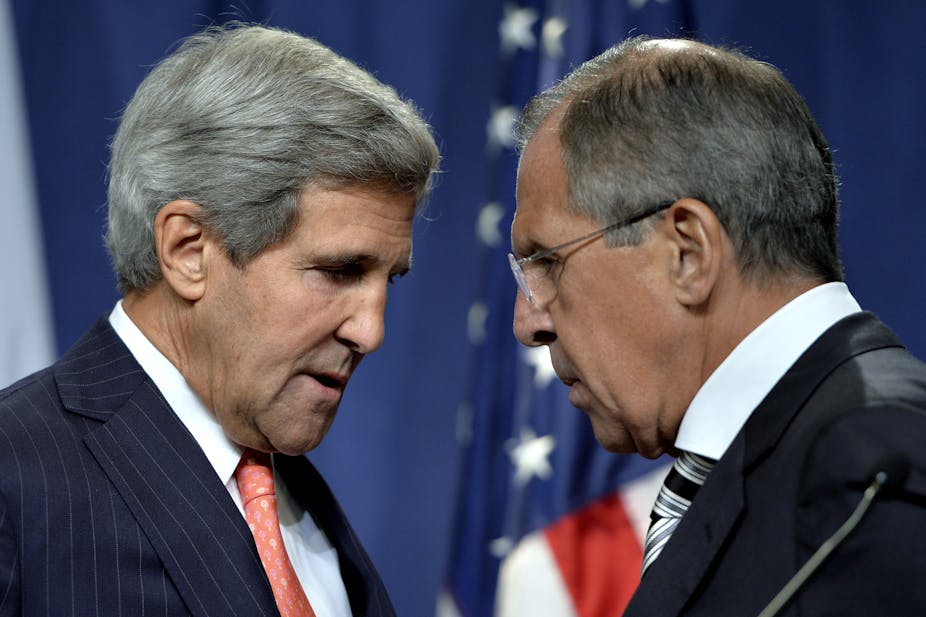Talks between US secretary of state John Kerry and his Russian counterpart, Sergei Lavrov, in Paris, followed after a week of high-level diplomacy, including a phone call between presidents Obama and Putin.
The very fact that the meeting was so hastily arranged and at the level of foreign ministers added to speculation that a breakthrough might be imminent that might lead to a solution of the crisis. While no agreement as such was achieved, it has become clear that despite their differences Washington and Moscow would continue their discussions about a possible deal.
Some of the parameters of such a deal were made public by Russia earlier, including demands for the federalisation and neutrality of Ukraine. The Russian proposal for Ukrainian neutrality and federalisation may be new in relation to Ukraine, but more than ten years ago, a similar plan, the so-called Kozak Memorandum, was put on the table by Putin for Moldova.
Moscow’s thinking in relation to both Moldova and Ukraine is clearly that as long as Russia can exercise a veto power over major foreign policy decisions – such as NATO or EU membership – by effectively controlling one or more of the federal entities in each state, they can secure a buffer zone around Russia and not face the same situation as they did with the Baltic states which joined both NATO and the EU.
While this Russian “plan” was promptly rejected by Ukraine’s foreign ministry, no such condemnation has yet been forthcoming from the West. This, and the fact that the talks happened and lasted for more than three hours indicates that the West might be willing to make a deal with Russia. This would likely mean accepting, at least tacitly, the annexation of Crimea and encouraging negotiations between Ukraine and Russia on a way forward that would protect the rest of Ukraine from further military action by Russia which could lead to the dismemberment of the country
Problems of trust
Yet, at the same time, it is obvious that Washington and Moscow remain distrustful of each other’s intentions. Russia has built up its troops on the eastern borders of Ukraine, The US prematurely sent back NATO’s supreme allied commander for Europe, General Philip Breedlove, to Europe when he was on a trip to the US. He is also head of the US military’s European command.
All this suggests that Russia is keeping the possibility of a military option open, and that the West has recognised this as well as the fact that it can do very little in response – apart from trying to talk Russia out of a full-scale invasion of Ukraine.
In other words, there is a growing sense that, however unpleasant and humiliating for Kiev, Brussels and Washington, Crimea is lost to Ukraine. So the game is now on over what is left of Ukraine and for what Putin and his inner circle may consider Russia’s “legitimate” zone of influence. Depressing as it may be, this is very much a game in the style of the Cold War between Washington and Moscow in which Ukraine is merely a pawn and in which major US allies – Germany, the UK, France, and Poland – remain sidelined as Washington and Moscow negotiate.
A deal to save face
Making a deal would be a much lower-cost approach for the Kremlin than to take parts of Ukraine or Moldova by force or invest in long-term destabilisation of either country by using ethnic Russians as proxies. Talking might open the way towards some rapprochement with the West, thus avoiding a further escalation of sanctions —- which are costly for both sides.
More constructive dialogue between Russia and the West would possibly enable a face-saving way out of the current deadlock. This would serve both sides in the new great game over influence in Eastern Europe, but Russia would be the clear winner, and Ukraine the first victim of this new geopolitics.
For the West, the question is whether any further escalation and the costs associated with it are worth the price of making a point about Crimea in the expectation that Russia will not undo the peninsula’s annexation.
Undoubtedly, there are some very important principles of international law at stake, and this is why the annexation of Crimea will not be recognised by the West. Yet, there is also the geopolitical calculation of the situation and that would still suggest that Russia and the West need each other as partners.
This partnership has been difficult for some time -— over Kosovo, Libya, Syria, Iran, North Korea -— but much like in the Cold War, which we can now clearly see Crimea as being the latest instalment of, we need to come to terms with the fact that Russia and the West see many things in quite different ways. From a Western perspective, this means it’s necessary to find ways to manage these differences rather than trying to overcome them.

